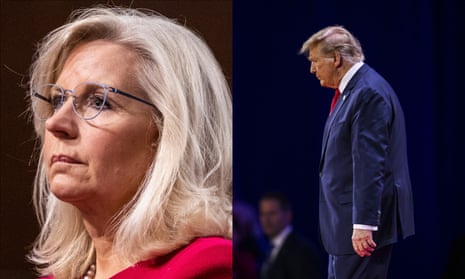
Liz Cheney: supreme court delay will deny voters ‘crucial evidence’ on Trump
Republican demands that justices come to a speedy verdict after supreme court decision to hear Trump election interference case
The Guardian
Thu 29 Feb 2024 14.03 EST
Last modified on Thu 29 Feb 2024 16.50 ESTA Republican member of the January 6 committee has said the supreme court’s decision to wade into Donald Trump’s immunity case will deny Americans crucial information about the former president’s efforts to overturn his 2020 election defeat.
Liz Cheney, a former Wyoming congresswoman who was ousted by primary voters angry at her participation in the hearings that followed the insurrection, also demanded the justices come to a speedy decision.
In a message posted to X, formerly Twitter, Cheney, a vocal Trump critic, said voters needed to have a verdict on the presumed Republican presidential nominee before they go to the polls in November.
“Delaying the January 6 trial suppresses critical evidence that Americans deserve to hear,” she wrote.“Donald Trump attempted to overturn an election and seize power. Our justice system must be able to bring him to trial before the next election. SCOTUS [supreme court of the US] should decide this case promptly.”
Justices on Wednesday set the week of 22 April to hear oral arguments over Trump’s assertion that he cannot be held criminally responsible for actions he took to overturn his 2020 defeat by Joe Biden.
Trump, who is facing a four-count indictment including conspiracy to defraud the US and conspiracy to obstruct the congressional certification of the election results, has declared the decision a victory, mostly because it puts the trial on hold, possibly until after the election.
Some Democrats, meanwhile, are also upbeat about it. The California congressman Ted Lieu, who has previously accused Trump of committing multiple election crimes, said such a delay would work to his party’s advantage at the ballot box.
“My view of the SCOTUS action: if the trial is delayed until after November, we will see the largest blue wave in history,” he wrote, also on X.
“If November becomes a referendum on whether Trump faces justice, then Democrats will absolutely flip the House, keep the White House and expand the Senate.”Some legal experts are warning the supreme court’s action, along with delays already affecting several of the other legal cases Trump is facing, could have consequences for democracy.
While many believe the court will ultimately confirm the rejection by a Washington DC appeals court of Trump’s claim, they say the delay could prove harmful.
“This case really is most important in terms of democracy, and the most compelling with the evidence. That makes it very difficult in the sense there would be no verdict on this critical issue that cuts to the heart of democracy,” said Carl Tobias, Williams professor of law at the University of Richmond and a veteran supreme court analyst.
“Maybe the supreme court just couldn’t resist, as the highest court in the land, weighing in on this very weighty question of presidential immunity, though most people who are clear-eyed about this don’t believe that there’s much of an argument for immunity in this context.
“The court could have been perfectly satisfied with the DC circuit opinion, which was comprehensive and clear, and just seen no reason to take it up. But this is about delay. I don’t think anybody really disputes that. Trump’s theory over his entire life in litigation is that delay is his friend, and here it really is. It’s conceivable none of these cases goes to verdict before the election.”
In a post on his Truth Social platform on Wednesday, Trump claimed that “legal scholars are extremely thankful for the supreme court’s decision”, and insisted without irony that future presidents would fear “wrongful prosecution and retaliation” after they left office if he loses.
Trump himself has spoken openly of seeking “retribution and revenge” over political foes if he is returned to office, and said he would appoint a special prosecutor to “go after” Biden and his family.
A former lawyer and legal analyst Lisa Rubin said she was “beyond terrified for our country” because the supreme court will delay the trial and potentially affect the election.
“I honestly thought there would be enough votes on the court not to take this case, for no other reason than bad facts make bad law,” she told MSNBC News. “And the facts here could not be worse. If there was a context in which you wanted to decide the bounds of presidential immunity it’s not this case.”
With oral arguments set for April, a ruling might not be handed down until May at the earliest.
Alternatively, in the worst-case scenario for special counsel Jack Smith, the supreme court could wait until the end of its current term in July. That could mean the start of a trial expected to take up to three months might be delayed until no earlier than late September.
Trump’s legal strategy has been to stall the various cases against him, ideally until after November’s election, in the hopes that a second term of office will allow him to pardon himself or install a loyal attorney general to drop charges.
And "Coke Can" Clarence Thomas shows no inclination at all to recuse himself - even though his wife participated in the conspiracy.Hugo Lowell contributed reporting



No comments:
Post a Comment